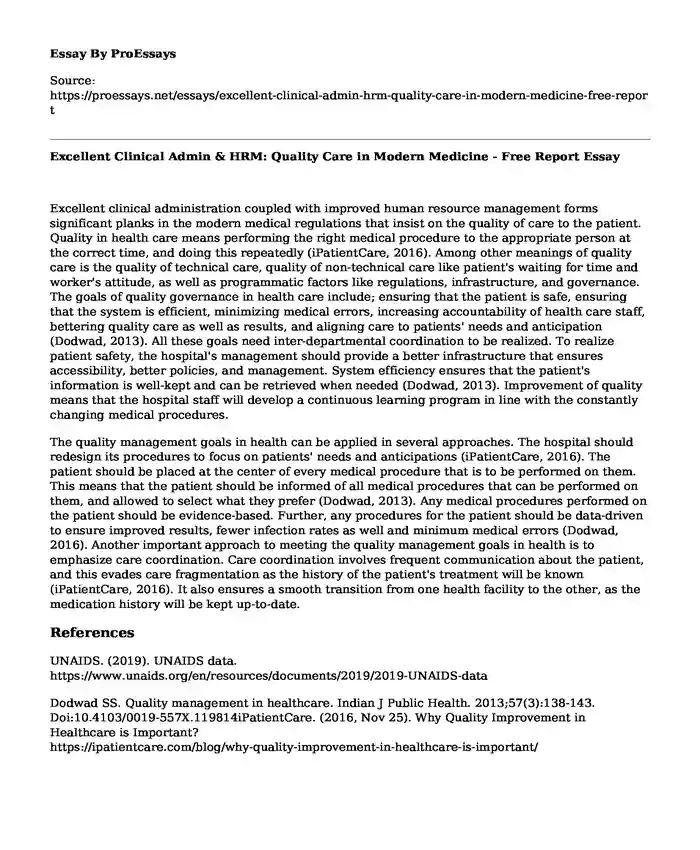Excellent clinical administration coupled with improved human resource management forms significant planks in the modern medical regulations that insist on the quality of care to the patient. Quality in health care means performing the right medical procedure to the appropriate person at the correct time, and doing this repeatedly (iPatientCare, 2016). Among other meanings of quality care is the quality of technical care, quality of non-technical care like patient's waiting for time and worker's attitude, as well as programmatic factors like regulations, infrastructure, and governance. The goals of quality governance in health care include; ensuring that the patient is safe, ensuring that the system is efficient, minimizing medical errors, increasing accountability of health care staff, bettering quality care as well as results, and aligning care to patients' needs and anticipation (Dodwad, 2013). All these goals need inter-departmental coordination to be realized. To realize patient safety, the hospital's management should provide a better infrastructure that ensures accessibility, better policies, and management. System efficiency ensures that the patient's information is well-kept and can be retrieved when needed (Dodwad, 2013). Improvement of quality means that the hospital staff will develop a continuous learning program in line with the constantly changing medical procedures.
The quality management goals in health can be applied in several approaches. The hospital should redesign its procedures to focus on patients' needs and anticipations (iPatientCare, 2016). The patient should be placed at the center of every medical procedure that is to be performed on them. This means that the patient should be informed of all medical procedures that can be performed on them, and allowed to select what they prefer (Dodwad, 2013). Any medical procedures performed on the patient should be evidence-based. Further, any procedures for the patient should be data-driven to ensure improved results, fewer infection rates as well and minimum medical errors (Dodwad, 2016). Another important approach to meeting the quality management goals in health is to emphasize care coordination. Care coordination involves frequent communication about the patient, and this evades care fragmentation as the history of the patient's treatment will be known (iPatientCare, 2016). It also ensures a smooth transition from one health facility to the other, as the medication history will be kept up-to-date.
References
UNAIDS. (2019). UNAIDS data. https://www.unaids.org/en/resources/documents/2019/2019-UNAIDS-data
Dodwad SS. Quality management in healthcare. Indian J Public Health. 2013;57(3):138-143. Doi:10.4103/0019-557X.119814iPatientCare. (2016, Nov 25). Why Quality Improvement in Healthcare is Important? https://ipatientcare.com/blog/why-quality-improvement-in-healthcare-is-important/
Cite this page
Excellent Clinical Admin & HRM: Quality Care in Modern Medicine - Free Report. (2023, Nov 18). Retrieved from https://proessays.net/essays/excellent-clinical-admin-hrm-quality-care-in-modern-medicine-free-report
If you are the original author of this essay and no longer wish to have it published on the ProEssays website, please click below to request its removal:
- Autonomy, Liberty Rights, and the Principle of Noninterference in Drugs and Alcohol
- Essay Sample on Democratic Leadership
- Paper Example on Treating Hypertension & Heart Failure With Trandolapril
- Essay Example on Obama Care in Texas: Potential Issues and Challenges
- Essay Example on the Department of Health and Human Services
- Colgate: From Local to Global in 21st Century - Essay Sample
- Free Paper Sample on IPV: A Global Public Health Concern







